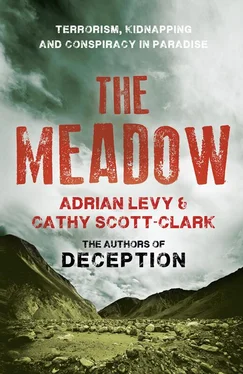Most vocal were a couple of Kashmiri staffers. They were in the camp that firmly believed he should go. Over a cup of tea, they told him alluring stories of the challenging trekking, the wildlife and the wildness around Pahalgam. It was a world away from the troubles, they said, ‘a paradise on earth that everyone should experience at least once in their lives’. All Kashmiris knew, they insisted, that the insurgency was restricted to the LoC and to militant-infested towns in the north of the valley like Kupwara, Sopore and Baramulla. No one had any interest in getting tourists mixed up in a local dispute. The militancy had been rumbling on for six years already, and Pahalgam remained thronged with trekkers.
These two employees seemed credible and likeable, and they gave John numbers for local contacts: guides, hotels and taxi drivers, many of whom they were related to and said they trusted completely. Eventually, even the cautious John was persuaded, and he arranged a six-day excursion through his hotel. Taking account of flight connections, that would give him four days’ trekking, which was just about enough. ‘In life, you go to many places and you have to make many judgements about your own safety,’ he said. ‘And my judgement at that moment in time was that Kashmir would be OK.’
As their plane approached Srinagar airport on 26 June, Jane Schelly and Don Hutchings had heart-stopping glimpses of the Himalayas bursting through the clouds, and a lattice of orchards, conifers and villages sprinkled across the dun-coloured Kashmir Valley. After bumping down on the runway, the plane rumbled past rows of Indian Air Force fighter jets, military transporters and camouflaged helicopters. Here were gun emplacements and corrugated-iron hangars, all of them draped in olive-green netting. Sentries in foxholes, machine-gunners in pillboxes, zoomed in on the plane. Jane and Don immediately forgot the reassuring news they had just read in the paper: US Ambassador Frank Wisner, accompanied by his daughter, had returned from a fly-fishing trip to Pahalgam. This place looked like a war zone.
But as they stepped down onto the tarmac, the cool air was a joy after New Delhi. Up ahead, beyond the exit barrier, what looked like a thousand sombre male faces, many of them bearded, most of them smoking, eyed them. Aquiline noses, cat-green eyes, skin so fair that many seemed more Aryan than Don or Jane – some Kashmiris could have passed as Europeans. The noise was overwhelming: a helicopter whumping somewhere above them, tour guides shouting to get their attention.
As Jane and Don stood by the ancient, flaking luggage carousel, a police official sought them out and took their names, passport details and notes on their itinerary. ‘Foreigner registration,’ he said by way of explanation, tapping a laminated label on his clipboard. ‘What a madhouse,’ Jane recalled. ‘It was an absolute nightmare … I had to open and taste my sealed pack of Western Trail mix to show it wasn’t poison or a bomb. The absolute bizarreness of the whole process almost made it entertaining.’
Outside, the full scale of the Indian military operation in Kashmir hit them: a chaotic jumble of sandbags, concrete barriers and barbed wire, the roads jammed with armoured vehicles of all descriptions: trucks, pickups, tanks, around which scores of heavily armed soldiers milled. It took an hour to get through the checkpoints encircling the airport. Barrelling into town, their taxi passed yet more bunkers and pickets, out of which dark-skinned Indian soldiers peered, their guns aimed at Kashmiri men and women who walked solemnly along the broken pavements, heads cast downwards.
Gigantic piles of decomposing trash were everywhere, with sleeping pi-dogs lying on top of them. Not a windowpane seemed intact. Shops were barricaded or boarded up. Long avenues lined by trees were choked by every kind of machine of war imaginable. At one point the driver slammed on his brakes to avoid an oncoming army convoy, a vast column of khaki lorries with soldiers riding atop them, their faces obscured by black bandanas, who beat canes on the side of the taxi, drumming everyone out of their way. ‘Welcome to Kashmir,’ he muttered under his breath. Jane and Don said nothing. ‘We hadn’t expected things to be this bad, no way,’ Jane said.
Then she and Don caught a glimpse of the mountains ringing the city, and the hairs rose on her arms.
Конец ознакомительного фрагмента.
Текст предоставлен ООО «ЛитРес».
Прочитайте эту книгу целиком, купив полную легальную версию на ЛитРес.
Безопасно оплатить книгу можно банковской картой Visa, MasterCard, Maestro, со счета мобильного телефона, с платежного терминала, в салоне МТС или Связной, через PayPal, WebMoney, Яндекс.Деньги, QIWI Кошелек, бонусными картами или другим удобным Вам способом.











